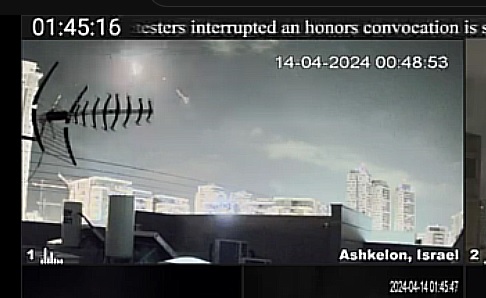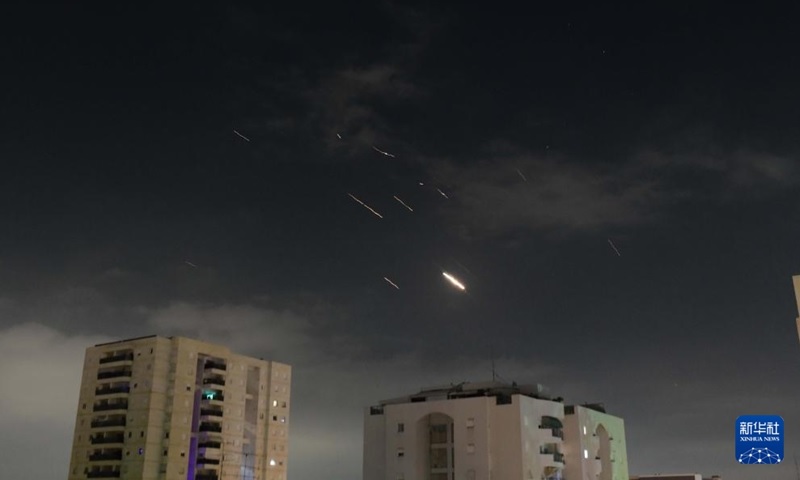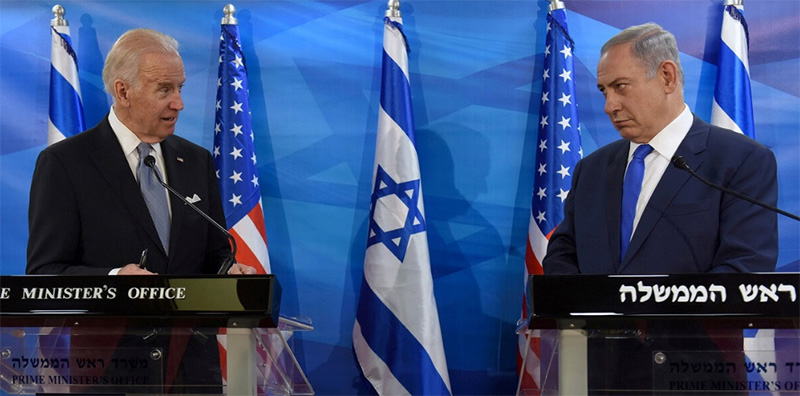 Israeli air defense meets Iranian attack drones in the skies over the city of Ashkelon.
Israeli air defense meets Iranian attack drones in the skies over the city of Ashkelon.
Photo: The live broadcast screen.
Tel Aviv condemned the move as a “dangerous escalation” and said its forces were on high alert, writes Will Porter, an assistant news editor at the Libertarian Institute and a regular contributor at Antiwar.com. Find more of his work at Consortium News and ZeroHedge.
The Iranian military has launched an attack on Israel involving “dozens” of drones, Tehran’s Islamic Revolutionary Guard Corps (IRGC) said, noting the strikes were retaliation for a deadly Israeli strike on the Iranian consulate in Damascus.
The attack was announced on Saturday in a statement carried by Iranian state media, saying the UAVs were “fired at the occupied territories and positions of the Zionist regime.”
“In response to the numerous crimes committed by the Zionist regime, including the attack on the consular section of the Iranian embassy in Damascus and the martyrdom of a group of commanders and military advisors of our country in Syria, the IRGC Aerospace Force fired dozens of missiles at specific targets inside the occupied territories,” the statement said.
US and Israeli officials have acknowledged the attack, with the IDF saying it was on “high alert” and “constantly monitoring the operational situation.”
“Iran has launched a direct attack from Iranian soil towards the state of Israel,” IDF spokesman Rear Admiral Daniel Hagari said in a video statement, adding “This is a severe and dangerous escalation. Our offensive and defensive capabilities are at a high state of readiness ahead of this large-scale attack from Iran.”
The White House similarly said it was closely following the situation and was in “constant communication with Israeli officials as well as other partners and allies.” National Security Council spokesperson Adrienne Watson predicted the attack would likely “unfold over a number of hours,” and reiterated US support for Israel.
When asked whether Washington would directly intervene in hostilities between Israel and Iran during a press briefing earlier this week, Pentagon spokesman Patrick Ryder declined to “get into hypotheticals,” only reiterating the US’ “ironclad commitment to Israel’s security.”
The attack comes weeks after Israeli forces bombed Tehran’s consulate building in the Syrian capital, killing seven officials, including a senior IRGC commander, Brig. Gen. Mohammad Reza Zahedi. The attack triggered a major spike in regional tensions, and Iran vow to respond in kind.

Iran launched large-scale drone, missile attack against Israel on Sunday.
Photo: Xinhua
Some experts told the Global Times on Sunday that Iran's choice to use drones for the attack has the advantage of being cost-effective and difficult for the opponent to intercept, putting significant pressure on Israel's air defense systems.
If military conflict between Iran and Israel escalates, the likelihood of US intervention will increase, experts said.
Over 200 missiles and drones have been launched from Iran to Israel, and the vast majority were intercepted but an unknown number of missiles fell in Israeli territory, Israel Defense Forces spokesperson Daniel Hagari was quoted as saying in media reports on Sunday.
One strike led to "slight damage to infrastructure" at a military base in southern Israel, according to media reports.
A Russian news agency reported on Sunday that the anonymous Israeli officials claimed to Ynet that 99 percent of Iran's projectiles were intercepted.
Israeli officials also said that for the first direct attack by Iran on the Jewish state, a decisive counterstrike is necessary.
Iran's mission to the UN said that following the launch of the drones toward Israel, Tehran now considered that its retaliation for an attack on its diplomatic compound in Damascus to be over, the Wall Street Journal said.
A military expert who spoke on the condition of anonymity told the Global Times on Sunday that it was clear that Iran's purpose in launching the attack was to retaliate for the bombing of the Iranian embassy by Israel.
Wei Dongxu, editor of a military program on Global News Radio, told the Global Times on Sunday that Iran's suicidal drones have a very long range, reaching hundreds or even thousands of kilometers.
For Israel, even if its "Iron Dome" defense system can intercept suicide drones, if there are a large number of drones in a short time, Israel's air defense system will face significant pressure. Additionally, Iran also has the capability to supply suicide drones to pro-Iran armed groups in the Middle East, allowing them to use forward launch positions near Israel to engage in coordinated attacks, Wei said.
"Facing a large-scale Iranian drone and missile attack, Israel's air defense and missile defense systems are unable to fully defend saturation attacks by ballistic missiles and suicide drones. Once Israeli air force bases are struck, the Israeli military's counterattack capability will also be weakened," Wei said.
Wei also said that the current situation in the Middle East is complex. Iran's retaliation is primarily in response to the calls of its own people, while also demonstrating strength and determination in the current turbulent regional situation. However, Iran does not wish to be drawn into a large-scale conflict or war.
Observers predicted that Israel might retaliate, hoping to involve Iran in a regional war and thereby pull the US into the mire, which is Israel's goal, the expert said.
The current Biden administration's support for Israel has waned recently, and Israel is trying to tie the Biden administration down, hoping to regain its strong support. However, the US attitude is somewhat ambiguous. If Iran and Israel engage in large-scale warfare, the US will be drawn into it, which is "something the US does not wish to see," the expert added.
"From a global strategic perspective, the US does not want to commit too many resources to the Middle East, as this would affect US aid to Ukraine in the Russia-Ukraine conflict, as well as its strategic planning in the Asia-Pacific region," the expert said.

President Biden told Israeli prime minister Benjamin Netanyahu during a call on Saturday that the U.S. won't support any Israeli counterattack against Iran, a senior White House official told Axios.
Why it matters: Biden and his senior advisers are highly concerned an Israeli response to Iran's attack on Israel would lead to a regional war with catastrophic consequences, U.S. officials said.
Behind the scenes: Biden told Netanyahu the joint defensive efforts by Israel, the U.S. and other countries in the region led to the failure of the Iranian attack, according to the White House official.
"You got a win. Take the win," Biden told Netanyahu, according to the official.
The official said that when Biden told Netanyahu that the U.S. will not participate in any offensive operations against Iran and will not support such operations, Netanyahu said he understood.
read more in our Telegram-channel https://t.me/The_International_Affairs

 10:57 14.04.2024 •
10:57 14.04.2024 •






















